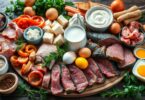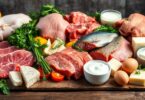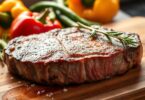Throughout my life, I have been a steadfast proponent of the intrinsic value of animal-based source foods for their health benefits. My upbringing on a family farm instilled in me a profound appreciation for the nutritional richness these foods offer. From the luscious milk of our heritage breed cows to the golden eggs from our free-ranging hens, I have personally experienced their transformative impact on my health. This experience has driven my desire to disseminate their benefits to a broader audience.
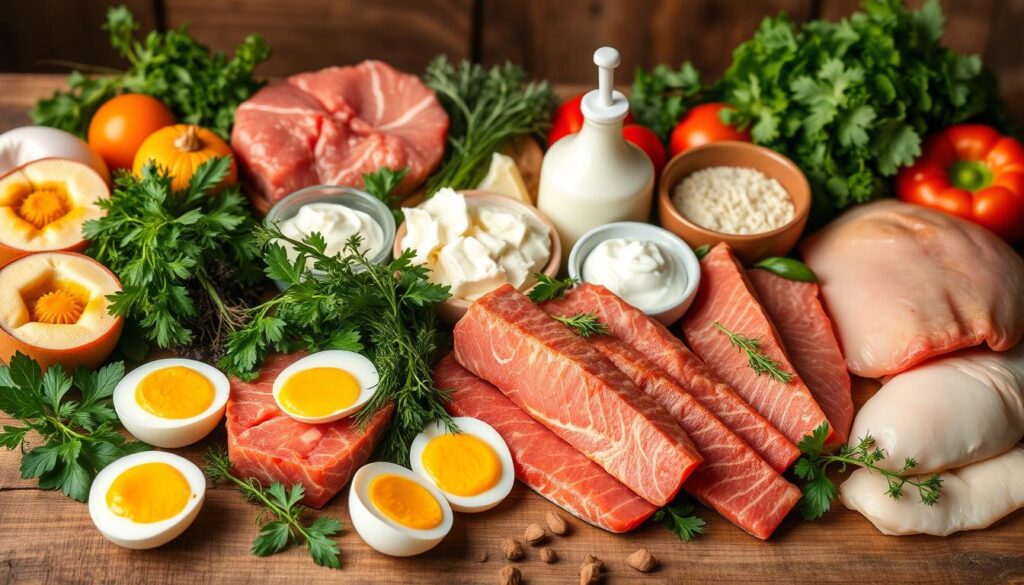
Key Takeaways
- Animal-based foods are an essential part of a balanced diet, providing complete proteins, essential amino acids, and vital nutrients.
- The animal-based diet prioritizes well-raised animal products and focuses on low to medium-toxicity carbohydrates, eliminating highly processed foods.
- This approach aims to support overall health, weight management, and address autoimmune symptoms.
- Animal protein from ruminant animals and organ meats are prioritized in the low-toxicity food category.
- Pasture-raised eggs, A1 or A2 dairy products, and certain fruits and fats are also considered low-toxicity animal-based foods.
Understanding Animal-Based Foods: A Comprehensive Guide
Animal-based foods constitute the bedrock of a diet that is both nutritious and balanced. These protein-rich entities, encompassing meats, fish, eggs, and dairy, are indispensable for human health optimization. Grasping the various categories, roles, and historical importance of these foods is crucial for their effective integration into one’s lifestyle.
Different Categories of Animal-Based Foods
Animal-based foods are segmented into low, medium, and high toxicity groups. Low toxicity foods, which should predominate in one’s diet, include ruminant meats (beef, lamb, bison), organ meats, eggs, and raw dairy. These are complemented by medium toxicity foods, such as fermented vegetables and grains, which should be consumed in moderation. Conversely, high toxicity foods, including seed oils and highly processed items, are to be limited.
The Role of Animal Products in Human Nutrition
Animal products serve as a complete source of protein, encompassing all essential amino acids necessary for human health. They also provide a spectrum of critical vitamins and minerals, including vitamin B12, iron, and zinc, vital for optimal bodily function. The inclusion of animal-based foods in one’s diet can facilitate enhanced muscle growth, improved digestion, and reduced inflammation.
Historical Significance of Animal Foods
Throughout human history, animal-based foods have been esteemed for their nutrient density and role in sustaining our species. These nutrient-dense foods were pivotal in human evolution, offering the necessary energy and building blocks for our ancestors’ survival and prosperity. Recognizing the historical importance of animal-based nutrition underscores their continued relevance in contemporary diets.
| Animal-Based Food Category | Examples | Nutritional Benefits |
|---|---|---|
| Low Toxicity | Beef, lamb, bison, eggs, raw dairy | Complete proteins, essential vitamins and minerals |
| Medium Toxicity | Fermented vegetables and grains | Probiotic benefits, partial nutrient profile |
| High Toxicity | Seed oils, highly processed foods | Potential inflammatory effects, nutrient-poor |

“Animal-based foods have been a fundamental part of the human diet for thousands of years, providing the essential nutrients needed for our species to thrive and evolve.”
Essential Animal-Based Source Benefits for Overall Health
Animal-based foods, renowned for their delectability, also serve as a treasure trove of vital nutrients, pivotal for maintaining health and enhancing well-being. These protein-rich entities are distinguished by their capacity to provide complete proteins, encompassing all requisite amino acids for optimal bodily functions.
Contrasting with plant-based proteins, animal proteins exhibit superior bioavailability, facilitating more efficient absorption by the body. They also boast a wider array of vitamins and minerals, positioning them as the preferred option for those aiming to bolster their nutritional intake, augment muscle mass, or rectify nutrient deficiencies.
Fatty fish, exemplified by salmon and mackerel, are replete with omega-3 fatty acids, indispensable for brain health, cardiac function, and inflammation reduction. Conversely, organ meats, such as liver and kidneys, are nutrient-dense, overflowing with vitamins A, B, and C, alongside essential minerals like iron and zinc.
Furthermore, the judicious inclusion of animal-based foods in one’s diet can contribute to effective weight management, amelioration of autoimmune symptoms, and enhancement of fertility. By integrating a diverse array of high-quality animal proteins into your alimentary regimen, you can access a plethora of health benefits, thereby fortifying your overall well-being.
| Animal Food | Top Nutritional Benefits |
|---|---|
| Fatty Fish | Omega-3 fatty acids, vitamin D, selenium |
| Organ Meats | Vitamins A, B, C, iron, zinc |
| Eggs | Complete proteins, choline, vitamin D |
| Dairy Products | Calcium, protein, vitamin B12 |
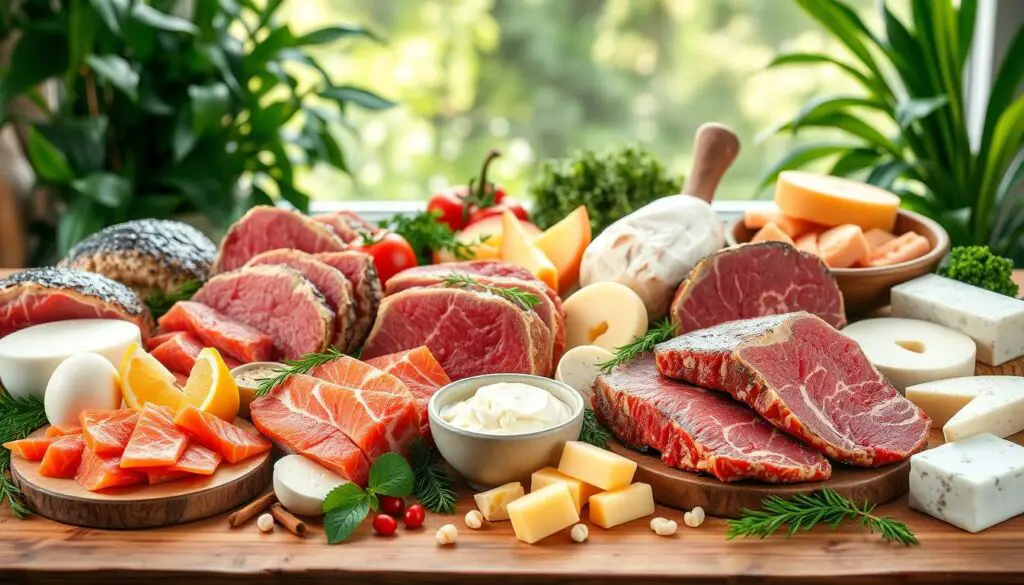
By meticulously selecting high-quality animal-based foods and integrating them into a well-balanced diet, one can unlock a myriad of health benefits, thereby fortifying overall well-being.
“Animal proteins have a considerable advantage in terms of enhancing nutritional status compared to plant proteins.”
Complete Proteins: Why Animal Sources Matter
The maintenance of a balanced, nutritious diet is paramount for overall health and well-being. At the core of this necessity lies the significance of complete proteins – those that encompass all nine essential amino acids the human body necessitates but cannot synthesize independently. Animal-based foods, such as lean meats, fish, eggs, and dairy, stand out as premier sources of these complete proteins. They offer manifold benefits beyond their exceptional nutritional profile.
Nine Essential Amino Acids in Animal Proteins
The human body necessitates 20 amino acids for optimal functioning, with 9 being essential. Animal proteins, unlike many plant-based alternatives, furnish all nine of these essential amino acids in the requisite proportions. This renders them a superior option for supporting muscle growth, tissue repair, and overall bodily functions.
Protein Absorption and Bioavailability
Animal-based proteins, in addition to their complete amino acid profile, exhibit high bioavailability. This signifies that the body can efficiently absorb and utilize these nutrients. Consequently, it results in superior protein utilization and incorporation into the body’s tissues, surpassing some plant-based proteins with lower digestibility.
Daily Protein Requirements and Sources
- The Recommended Dietary Allowance (RDA) for protein is 0.8 grams per kilogram of body weight per day.
- Active adults may require 1.2-2 grams of protein per kilogram of body weight daily to support muscle growth and recovery.
- Lean meats, fish, eggs, and dairy are exemplary sources of high-quality, complete proteins to fulfill these daily requirements.
Incorporating a variety of nutrient-dense animal-based foods into your diet ensures your body’s access to the complete proteins it necessitates for optimal health, energy, and performance.

Top Quality Meats for Optimal Nutrition
In the quest for a diet rich in nutrients, the inclusion of premium meats is paramount. Lean cuts from sustainable animal foods such as beef, pork, and poultry are pivotal, offering a plethora of essential nutrients crucial for health.
Opting for lean nutrient-dense animal foods like beef tenderloin, pork tenderloin, and white-meat chicken is advisable. These cuts are not only rich in high-quality animal proteins but also contain less saturated fat than their fattier counterparts. Furthermore, omega-3 rich animal foods such as wild game meats serve as an excellent lean protein source, enriched with beneficial fats and animal sources of vitamins.
For a superior nutritional profile, select sustainable animal foods that are grass-fed or pasture-raised. These options generally boast higher levels of omega-3 fatty acids, conjugated linoleic acid (CLA), and antioxidants compared to conventionally raised animals.
| Lean Meat Cuts | Nutrient Profile | Recommended Serving Size |
|---|---|---|
| Beef Tenderloin | High in protein, B vitamins, iron, and zinc | 3-4 ounces |
| Pork Tenderloin | Excellent source of protein, thiamin, and selenium | 3-4 ounces |
| Chicken Breast | Rich in protein, niacin, vitamin B6, and phosphorus | 3-4 ounces |
| Venison | High in protein, iron, and omega-3 rich animal foods | 3-4 ounces |
Integrating meat into your diet necessitates attention to portion sizes and a balanced plate with a variety of nutrient-dense fruits, vegetables, and whole grains. By selecting sustainable animal foods and preparing them healthily, you can harness the myriad benefits of premium meats within a well-rounded, nutrient-dense animal foods-based regimen.
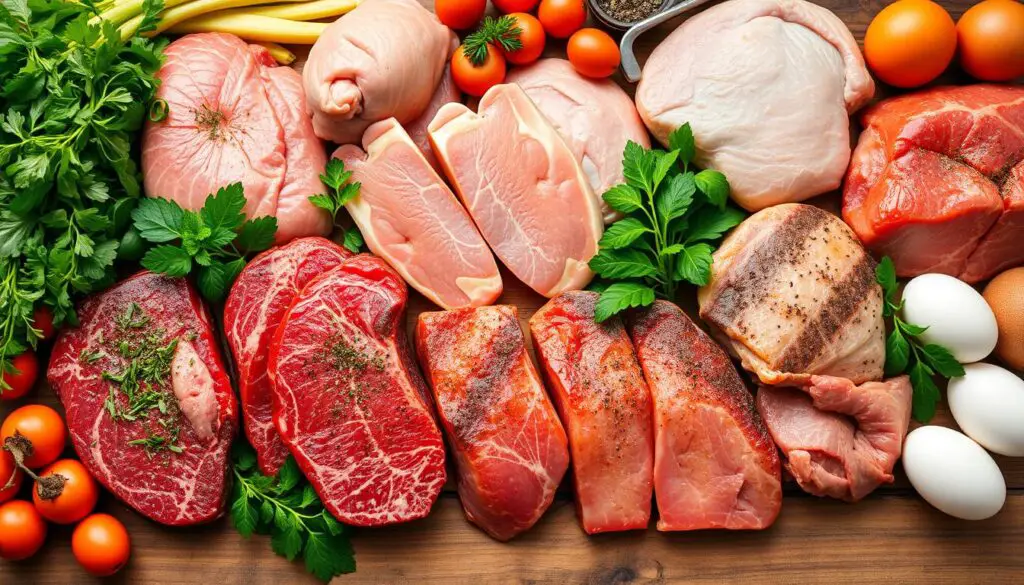
Fish and Seafood: Omega-3 Powerhouses
In the realm of animal-based nutrition, fish and seafood emerge as unparalleled champions. These foods are replete with high-quality protein, essential vitamins, minerals, and the coveted omega-3 fatty acids. These components are indispensable for heart, brain, and overall wellness.
Best Fish Species for Health Benefits
Fatty fish such as salmon, mackerel, sardines, and trout are paramount sources of omega-3s. A 3.5-ounce serving of wild-caught salmon can provide up to 700 international units (IU) of vitamin D, surpassing the USDA’s recommended daily allowance of 600 IU. Meanwhile, halibut offers an impressive 38 grams of protein per 6-ounce serving, accompanied by significant amounts of vitamin B12, selenium, niacin, magnesium, and vitamin B6.
Other fish species, such as cod, Chilean sea bass, sablefish, bluefin tuna, haddock, and petrake sole, also boast exceptional nutritional profiles. These fish are rich in omega-3 fatty acids, protein, vitamins, and minerals that support overall health and optimal bodily function.
Sustainable Seafood Choices
When selecting seafood, it is crucial to consider sustainability to protect our precious marine ecosystems. Wild-caught fish often possess superior nutrient profiles compared to farmed varieties but may also contain higher levels of environmental contaminants. The key is to find a balanced approach, enjoying a variety of sustainably sourced seafood to reap the benefits while minimizing potential risks.

“Seafood is a rich source of high-quality protein, omega-3 fatty acids, vitamins, and minerals crucial for heart health and cognitive function.”
By incorporating a range of nutrient-dense fish and seafood into your diet, you can unlock a treasure trove of animal-based benefits that support your overall well-being and help you thrive.
Dairy Products: Calcium and Protein Rich Options
Dairy products, encompassing a spectrum from milk and yogurt to cheese and kefir, serve as a quintessential source of calcium and protein. These items, abundant in the dairy aisle, play a pivotal role in enhancing overall health and well-being. In the United States, calcium supplements are among the most sought-after, given their importance in bone health. Remarkably, approximately 99% of the body’s calcium is found in bones and teeth.
Choosing organic or grass-fed dairy products is advisable, as they often possess higher nutrient levels and fewer additives compared to their conventional counterparts. For individuals with lactose intolerance or those adhering to a vegan diet, alternatives such as dark green, leafy vegetables, soy products, seeds, and almonds can provide essential calcium.
Greek yogurt stands out due to its elevated protein content, offering roughly 12% of the daily protein requirement in a single serving. Milk and cheese, too, are notable for their protein, aiding in muscle development and facilitating various bodily functions.
| Dairy Product | Calcium Content | Protein Content |
|---|---|---|
| Milk (1 cup) | 300 mg (30% DV) | 8 g |
| Yogurt (1 cup) | 450 mg (45% DV) | 12 g |
| Cheddar Cheese (1 oz) | 200 mg (20% DV) | 7 g |
| Kefir (1 cup) | 370 mg (37% DV) | 10 g |
Integrating dairy products into a well-rounded diet can effectively fulfill daily calcium and protein requirements, thereby bolstering overall health and wellness. It is crucial to consider personal dietary needs and preferences when selecting dairy options.
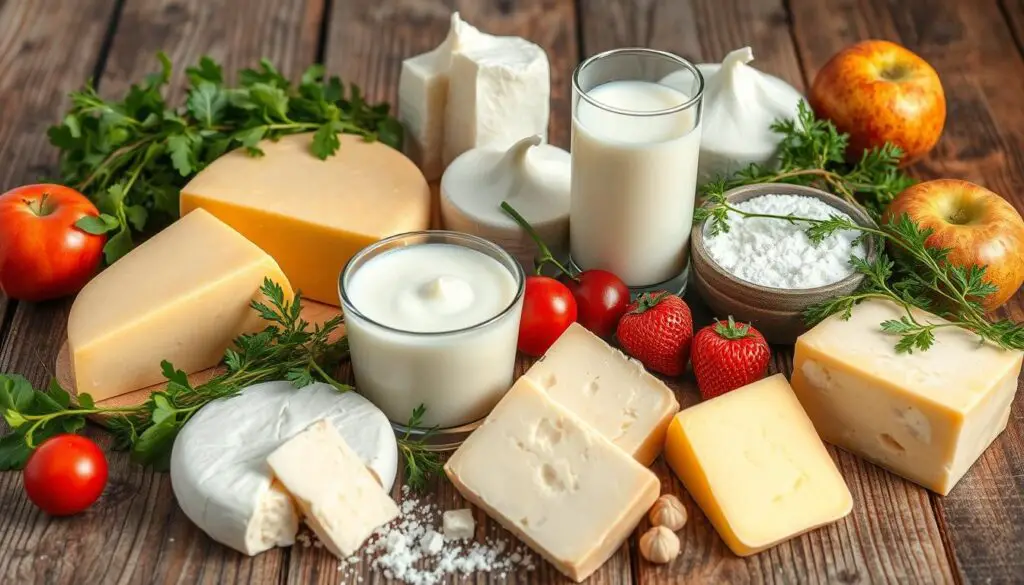
Eggs: Nature’s Perfect Protein Package
Eggs stand as a nutritional apex, offering a comprehensive blend of protein, vital vitamins, and minerals. These protein-rich animal products encompass all nine essential amino acids, positioning them as a superior source of animal protein for enhanced health and weight loss.
Nutritional Profile of Eggs
A single large egg harbors approximately 6 grams of protein, alongside significant amounts of vitamins A, D, B12, and choline. Eggs are also a treasure trove of healthy animal fats, boasting omega-3 fatty acids. The nutrient profile of eggs can fluctuate, influenced by the chickens’ diet. Pasture-raised or organic eggs may offer elevated levels of beneficial nutrients.
Different Ways to Incorporate Eggs
- Boiled or poached eggs serve as a rapid and protein-dense breakfast or snack.
- Scrambled eggs, enriched with poultry for protein, vegetables, and herbs, yield a nutritious and fulfilling meal.
- Omelets and frittatas, with their versatility, can be filled with a myriad of protein-rich animal products and fresh produce.
- Eggs are instrumental in baking, contributing moisture and structure to items such as quiches, frittatas, cakes, and cookies.
Integrating eggs for protein into your regimen is a straightforward yet impactful strategy for bolstering your health and wellness. It is particularly beneficial for increasing animal protein intake, supporting muscle development, or maintaining a well-balanced diet.

Organ Meats: Forgotten Superfoods
In the realm of nutrient-dense animal-based foods, organ meats such as liver, heart, and kidney are often overlooked in favor of more conventional cuts. These “forgotten superfoods” are, however, replete with essential vitamins, minerals, and other beneficial compounds that can profoundly enhance one’s health.
Organ meats are a treasure trove of vitamins A, B12, and folate, alongside crucial minerals like iron and zinc. They play a pivotal role in bolstering immune function, brain health, and serve as a high-quality source of animal-based fats for keto and collagen-rich protein. Despite their relative scarcity in contemporary diets, the inclusion of organ meats can revolutionize one’s nutrient intake.
Beef liver, for example, is a powerhouse, containing 20.4g of protein, 59.3μg of vitamin B6, and 62% of the daily recommended intake for iron within 100 grams. Beef kidney, on the other hand, offers 17.4g of protein, 98μg of folate, and 52% of the daily recommended intake for riboflavin per 100 grams.
Throughout history, diverse cultures have harnessed the health benefits of organ meats. The Inuit people frequently bestowed kidneys and the surrounding suet (60-70% saturated fat) to their children, while Native Americans favored the lean yet flavorful heart meat. Even ancient healers, such as Hippocrates, extolled the restorative virtues of liver.
Thus, it is imperative not to overlook these nutrient-dense organ meats. By integrating them into your diet, albeit in small quantities, you can experience the transformative health benefits they offer.

“Organ meats act as nature’s multivitamins, providing nutrients that are hard to obtain from other food sources.”
Healthy Cooking Methods for Animal-Based Foods
The selection of cooking methods for animal-based foods profoundly influences their nutritional content and health benefits. To preserve the nutritional integrity of your protein-packed foods, adopt these recommended cooking techniques:
Best Practices for Meat Preparation
Prefer cooking methods such as baking, boiling, broiling, poaching, and steaming. These methods are effective in preserving the dairy for strong bones and other vital nutrients, thereby avoiding excessive fat intake. Additionally, marinating your animal protein for weight gain can enhance flavor without increasing calorie content.
Avoid high-heat cooking methods that can result in charring or the creation of harmful compounds. Employ a meat thermometer to verify internal temperatures and ensure food safety.
Temperature and Timing Guidelines
- Cook poultry to an internal temperature of 165°F (74°C) to eliminate harmful bacteria.
- Ground meats should reach an internal temperature of 160°F (71°C).
- Steaks and roasts should be cooked to at least 145°F (63°C) for medium-rare doneness.
- Allow meat to rest for a few minutes before serving to ensure the best foods for healthy skin are evenly distributed throughout the dish.
By adhering to these healthy cooking methods and temperature guidelines, you can maximize the nutritional benefits of your animal products for brain health while ensuring food safety and culinary excellence.

Raw vs Cooked Animal Products
The ongoing debate between raw and cooked animal-based foods remains a topic of significant interest. Each option presents unique advantages and considerations for maintaining optimal health. Grasping the subtleties is crucial for making well-informed choices regarding the inclusion of grass-fed animal products, sustainable animal-based foods, high-protein animal-based snacks, healthy high-fat animal foods, and protein from animal sources in one’s diet.
Cooking animal products can enhance their digestibility and eliminate harmful pathogens. However, it may also diminish the levels of vital nutrients. A 2009 study demonstrated that cooking meat can lead to a reduction in vitamins B1, B2, B3, and minerals such as sodium, potassium, calcium, and magnesium. Conversely, the same study found that cooking can increase the levels of copper, zinc, and iron.
The risks associated with consuming raw meat, poultry, and seafood are undeniable. Nonetheless, the pioneering work of Francis Pottenger and George Minot in the 1930s highlights the potential nutritional benefits of raw animal foods. Pottenger’s research on cats showed that those fed raw diets exhibited superior health compared to those consuming cooked food.
Integrating both raw and cooked animal products into one’s diet can optimize nutrient intake while mitigating food safety concerns. Grass-fed and pasture-raised meats, raw dairy products, and organ meats serve as exemplary sources of healthy high-fat animal foods and protein from animal sources. Achieving a balanced intake of both can support overall health and wellbeing.
“The key is to find the right balance between raw and cooked animal products to meet your individual nutritional needs and ensure food safety.”

Animal-Based Foods for Muscle Growth
In the realm of muscle development and maintenance, animal-based foods emerge as a formidable asset. These foods are replete with essential amino acids, the fundamental components of protein, indispensable for muscle repair and expansion.
Timing Your Protein Intake
Optimal protein consumption timing is paramount for achieving maximum benefits. It is advisable to ingest 20-30 grams of high-quality protein per meal, supplemented by an additional serving post-exercise to facilitate muscle recovery and synthesis. The integration of animal proteins with carbohydrates can further augment this process.
Best Sources for Muscle Building
- Lean meats such as chicken breasts, turkey breast, and pork tenderloin stand out, offering approximately 26-27 grams of protein per 3-ounce serving.
- Eggs and Greek yogurt are also exemplary, with one cup of Greek yogurt containing an impressive 28 grams of protein.
- Fatty fish like tuna and salmon provide a potent combination of protein and muscle-building omega-3 fatty acids.
- Dairy products, including low-fat cottage cheese and milk, are rich in high-quality protein and other nutrients, crucial for muscle growth.
Quality and timing are paramount when it comes to animal-based foods for muscle growth. Strategically incorporate these nutrient-dense options throughout the day to support your fitness objectives.
| Food | Protein (g) per Serving |
|---|---|
| Chicken Breast | 26.7 |
| Greek Yogurt (1 cup) | 28 |
| Tuna (3 oz) | 20 |
| Lean Beef | Varies |
| Shrimp (3 oz) | 19 |
| Soybeans (1/2 cup cooked) | 16 |
| Cottage Cheese (1 cup) | 28 |
| Turkey Breast (3 oz) | 26 |
| Tilapia (3 oz) | 23 |
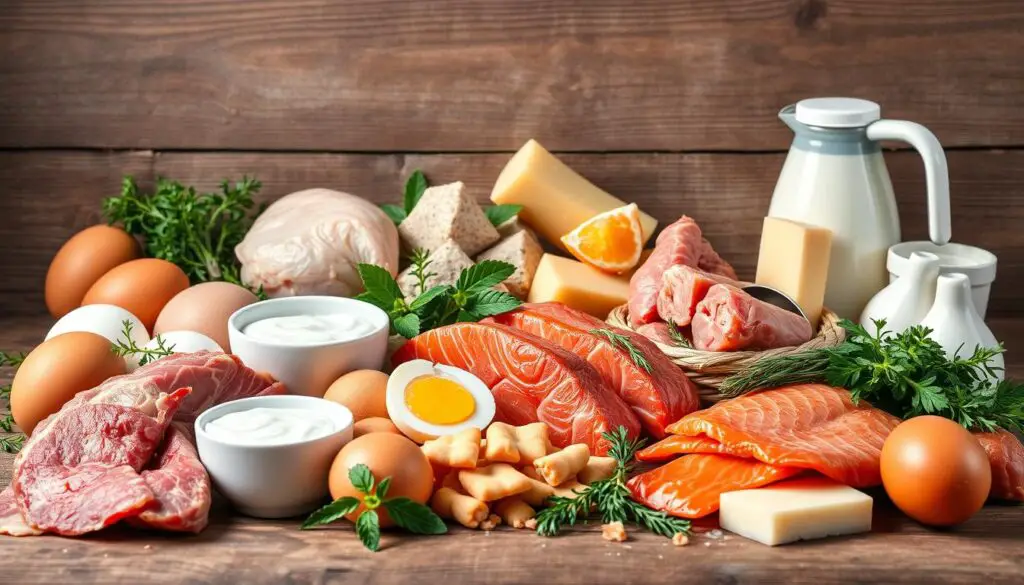
“Lean meats, eggs, and dairy are top choices for muscle building due to their complete protein profiles and essential amino acids.”
Selecting Quality Animal Products
In the realm of animal-based foods, the distinction between quality and quantity is paramount. The nutritional value and environmental impact of these products are directly influenced by their origin and production methods. Therefore, prioritizing the quality of animal-based foods is essential for maximizing their health benefits and minimizing their ecological footprint.
For poultry, the preference should be for birds raised on pasture or in free-range conditions. This approach ensures that the animals consume a more natural diet, thereby enhancing the nutritional content of the meat with omega-3 fatty acids and essential vitamins and minerals. Similarly, when it comes to seafood, the focus should be on wild-caught varieties, particularly those certified by organizations such as the Marine Stewardship Council (MSC). Such certifications guarantee that the seafood is harvested sustainably, preserving marine ecosystems for future generations.
- Choose grass-fed, pasture-raised, or wild-caught animal products whenever possible for optimal nutrient profiles.
- Look for organic certifications to ensure that the animal products are free from added hormones and antibiotics.
- For eggs, select pasture-raised or free-range options, as they tend to be richer in nutrients like vitamins A and E.
- When it comes to dairy, consider raw or A2 milk products if they are tolerated well, as they can provide a more natural and easily digestible source of calcium and protein.
Opting for high-quality animal products not only enhances the nutritional value of one’s diet but also elevates the culinary experience. Thoughtful selection of poultry, seafood, eggs, and dairy products supports sustainable and ethical animal-based food production. This approach ensures that consumers derive the maximum nutritional benefits while contributing to the well-being of the animals and the environment.
| Animal-Based Food | Quality Attributes | Nutritional Benefits |
|---|---|---|
| Poultry | Pasture-raised, free-range | Higher omega-3s, vitamins, minerals |
| Seafood | Wild-caught, sustainable | Rich in omega-3s, protein, nutrients |
| Eggs | Pasture-raised, free-range | Higher in vitamins A and E, carotenoids |
| Dairy | Raw, A2 milk | More easily digested, higher in calcium and protein |
By selecting high-quality animal-based foods, one can enjoy the nutritional benefits while supporting ethical and sustainable food production practices.
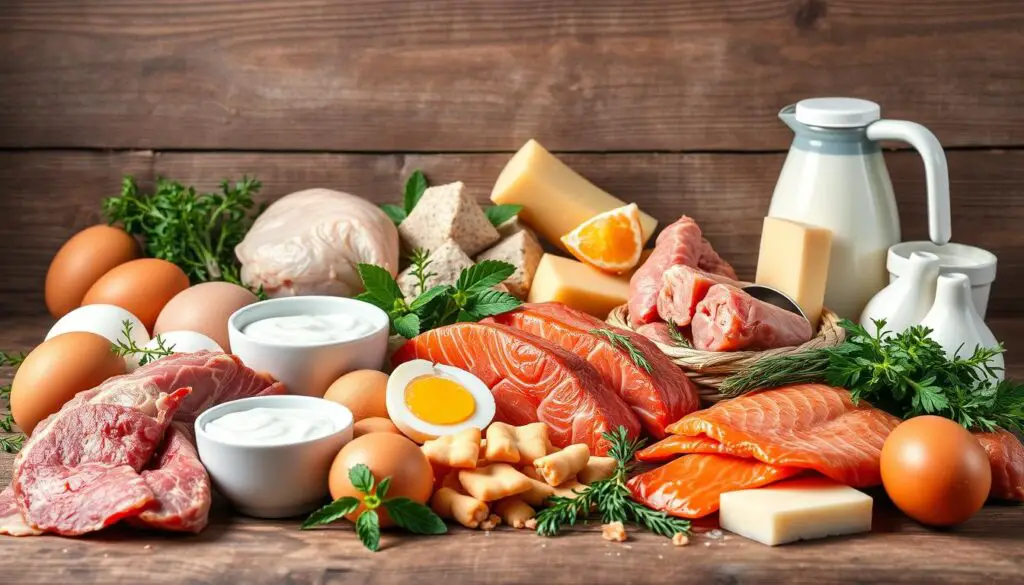
Portion Control and Serving Sizes
Proper portion control is paramount for sustaining a diet that is both balanced and nutritious. In the realm of animal-based foods, such as meat, dairy, and eggs, grasping the recommended serving sizes is essential for reaping their health benefits. A standard serving of cooked lean meat or poultry equates to approximately 3 to 4 ounces, mirroring the dimensions of a deck of cards or the span of your palm.
Recommended Daily Allowances
The U.S. Dietary Guidelines advocate for the daily intake of 5.5 ounces of protein-rich foods, encompassing meat, poultry, fish, eggs, and legumes, within a 2,000-calorie diet framework. For dairy products, the guideline suggests 3 cups of fat-free or low-fat varieties, such as milk, yogurt, and cheese. Grains are recommended at 6 ounces daily, with a stipulation that at least half should comprise whole grains.
Balancing Your Plate
In meal planning, strive to allocate one-fourth of your plate to a protein source, another fourth to whole grains, and half to non-starchy vegetables. Portion sizes should be adjusted according to individual caloric needs, activity levels, and health objectives. It is crucial to acknowledge that while animal-based foods can be integral to a balanced diet, vigilance is required regarding calorie-dense items like fatty meats and high-fat dairy products.
FAQ
What are the different categories of animal-based foods?
Animal-based foods are categorized into low, medium, and high toxicity groups. Low toxicity foods include ruminant meats, organ meats, eggs, raw dairy, and certain fruits. Medium toxicity foods encompass some fermented vegetables and grains. High toxicity foods, which should be limited, include seed oils and highly processed items.
What are the health benefits of animal-based foods?
Animal-based foods offer numerous health benefits, including complete protein profiles, essential amino acids, and bioavailable nutrients. They support muscle growth, brain function, and overall health. Fatty fish provide omega-3 fatty acids, while organ meats are rich in vitamins and minerals. Properly sourced animal products can contribute to weight management, improved autoimmune symptoms, and enhanced fertility.
Why are animal proteins considered complete proteins?
Animal proteins are complete, containing all nine essential amino acids. They have high bioavailability, meaning the body can efficiently absorb and utilize these proteins. The recommended dietary allowance (RDA) for protein is 0.8 grams per kilogram of body weight, but requirements may vary based on factors like age and activity level. Animal sources like lean meats, fish, eggs, and dairy provide high-quality protein to meet daily needs.
What are some high-quality meat options?
High-quality meats include lean cuts of beef, pork tenderloin, and white-meat poultry. These options are rich in protein, vitamins, and minerals while being lower in saturated fat. Grass-fed and pasture-raised meats often have better nutrient profiles. Wild game meats can also be excellent sources of lean protein and nutrients.
What are the benefits of including fatty fish in the diet?
Fatty fish like salmon, mackerel, sardines, and trout are excellent sources of omega-3 fatty acids, high-quality protein, and essential nutrients. These fish support heart health, brain function, and reduce inflammation. When choosing seafood, consider sustainability to protect marine ecosystems. Wild-caught fish often have better nutrient profiles but may contain higher levels of contaminants, so balance is key.
What are the nutritional benefits of dairy products?
Dairy products are excellent sources of calcium, protein, and other essential nutrients. Options include milk, yogurt, cheese, and kefir. Raw dairy and A2 milk may be easier to digest for some individuals. Greek yogurt is particularly high in protein. When choosing dairy, opt for organic or grass-fed options when possible for potentially higher nutrient content and fewer additives.
Why are eggs considered a nutrient-dense food?
Eggs are nutrient-dense, providing high-quality protein, vitamins, and minerals. They contain all nine essential amino acids and are versatile in cooking. Eggs can be prepared in numerous ways: boiled, scrambled, poached, or used in baking. They support muscle growth, brain health, and can be part of a weight management diet. Choose pasture-raised or organic eggs for potentially higher nutrient content.
What are the benefits of incorporating organ meats into the diet?
Organ meats like liver, heart, and kidney are incredibly nutrient-dense. They’re rich in vitamins A, B12, and folate, as well as minerals like iron and zinc. Organ meats can support immune function, brain health, and provide high-quality protein. While less common in modern diets, incorporating organ meats can significantly boost nutrient intake. Start with small amounts and gradually increase consumption.
What are some healthy cooking methods for animal-based foods?
Healthy cooking methods for animal-based foods include baking, boiling, broiling, poaching, and steaming. These methods help retain nutrients and avoid adding extra fats. Avoid charring or cooking meats at very high temperatures to reduce the formation of potentially harmful compounds. Use a meat thermometer to ensure proper internal temperatures for food safety. Marinating meats can add flavor without excessive calories.
What are the considerations for raw versus cooked animal products?
Both raw and cooked animal products have their place in a healthy diet. Cooking can increase digestibility and eliminate harmful bacteria, but may decrease some nutrient content. Raw dairy and certain raw fish preparations can offer unique nutritional benefits. However, proper food safety practices are crucial when consuming raw animal products. Balance between raw and cooked foods can optimize nutrient intake while ensuring food safety.
How can animal-based foods support muscle growth?
Animal-based foods are excellent for muscle growth due to their complete protein profiles and essential amino acids. Lean meats, eggs, and dairy are top choices. Timing protein intake around workouts can enhance muscle synthesis. Aim for 20-30 grams of protein per meal, with additional intake post-exercise. Combining animal proteins with carbohydrates can support muscle recovery and growth.
What should I look for when selecting quality animal products?
Choose grass-fed, pasture-raised, or wild-caught animal products when possible for optimal nutrient profiles. Look for organic certifications to avoid added hormones and antibiotics. For seafood, consider sustainability certifications. When selecting eggs, opt for pasture-raised or free-range. For dairy, consider raw or A2 options if tolerated. Quality animal products often have better taste and nutritional value.
How should I approach portion control with animal-based foods?
Proper portion control is crucial for a balanced diet. A serving of meat is typically 3-4 ounces, about the size of a deck of cards. For optimal nutrition, fill one-fourth of your plate with a protein source, another fourth with whole grains, and half with non-starchy vegetables. Adjust portion sizes based on individual needs, activity levels, and health goals. Be mindful of calorie-dense foods like cheese and fatty meats.
Source Links
- The Ultimate Animal Based Diet Food List (PDF Included!)
- High Protein Foods: 36 Meat & Plant-Based Sources
- Goodnight’s Guide to Animal-Based Eating: Nourish Your Body with Nature’s Best – Goodnight’s Red River Spice Company
- Carnivore Diet On a Budget – Heart & Soil Supplements
- Carnivore Diet: Food List, Benefits, Risks, and More
- Plant-Based vs. Animal-Based Nutrition
- Why Animal-Sourced Protein is Superior to Plant-Based Protein — Global Food Justice Alliance
- The Difference Between Incomplete and Complete Proteins, Explained
- What Are Complete Protein Foods? (vs. Incomplete Proteins)
- The healthiest sources of protein from animals
- Nutritional importance of animal-sourced foods in a healthy diet
- Types of Vitamins in Fish | Vital Choice
- Decoding the Nutritional Battle: Exploring Seafood Protein Versus Animal Protein
- Should Seafood Be a Part of My Carnivore Diet? | Nutrition with Judy
- Healthy Foods High in Calcium
- These Top Calcium Sources Might Surprise You
- 39 high-protein foods
- Cracking The Code: The Health Risks of Consuming Eggs
- Healthy Living with Whole Foods: How Nutrient-Dense Food Fuel Freedom
- Dr Berg Interviews Keto Blogger Tristan on Organ Meats| Dr. Berg
- Organ Meats: Beginners’ Guide to Ancient Superfoods
- A Guide to Animal Based Diets
- The Carnivore Diet Is Going Viral–Here’s What Experts Say
- Staying Healthy on the Go: Tips for Maintaining an Animal-Based Diet While Traveling
- What is the Raw Meat Carnivore Diet: Benefits and Risks
- How to Use Raw Dairy on the Carnivore Diet — RAW FARM usa
- Is the Raw Meat Diet Beneficial? | Nutrition with Judy | Holistic Wellness
- 26 Muscle Building Foods for Lean Muscle
- Carnivore Diet for Bodybuilding: Is Carnivore Diet Good for Bodybuilding?
- Can You Build Muscle on Carnivore Diet? | Carnivore Diet Plan for Gains
- Animal Versus Plant Protein in Food and Beverage Product Development
- Differences in perspectives on sustainability attributes of dietary protein sources between reduced animal-based dieters and nondieters – Humanities and Social Sciences Communications
- What Is a Serving?
- Portion sizes
- Suggested Servings From Each Food Group

